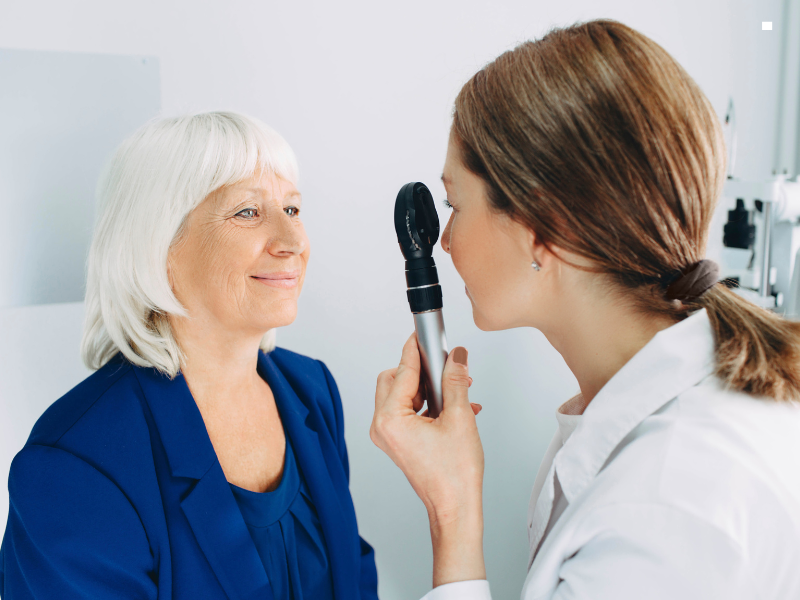Seniors Can Slow or Prevent Vision Impairment with Annual Eye Exams

Author: Debbie Humphrey
Many of us take our sight for granted. We observe beautiful Best Coast sunsets, watch sporting events, and capture the amazing flora and fauna surrounding our homes, beaches, and communities. It’s our little slice of paradise, without a doubt!
Now consider those who suffer from vision diseases and impairments that inhibit their ability to see these things clearly or at all.
Vision health is as important to seniors as regular physical check-ups, mental health management, and overall health and wellness.
Vision Today in Jacksonville explains, “People often overlook the crucial aspect of their overall systemic health: their eye health. With the hustle and bustle of daily life, it's easy to forget about scheduling those all-important annual eye exams. These exams are not just about determining if you need glasses or an update to your prescription; they're vital for detecting eye conditions early, preventing vision loss, and even revealing signs of underlying systemic health issues.”
Considering many of our clients contend with visual impairment due to cataracts and August is Vision Exam Awareness Month, I think it is worth exploring how seniors can slow or prevent vision impairment with annual eye exams.
Detecting Eye Conditions Early
Annual eye exams are critical to detecting eye conditions early. These conditions include glaucoma, macular degeneration, and cataracts, which typically have no symptoms in their early stages, so routine check-ups allow eye care professionals to detect these conditions early so they can be treated to reduce the risk of vision loss.
Glaucoma. Increased pressure inside the eye primarily causes this condition which can damage the optic nerve. The exact cause is unknown, but risk factors include age, a family history of the condition, diabetes, and severe myopia.
Glaucoma presents with no symptoms early on, but as the condition progresses, peripheral vision decreases, which leads to tunnel vision. In acute cases, symptoms may include severe eye pain, headache, blurred vision, and halos around lights.
If glaucoma is detected, treatment plans may call for prescription eye drops, oral medications, laser treatment, or surgery to lower the intraocular pressure to prevent further damage to the optic nerve.
Macular Degeneration. Age-related macular degeneration (AMD) is caused by the aging and thinning of the macular tissues, the deposit of drusen, or leakage from blood vessels under the retina. Risk factors include age, genetics, smoking, and high blood pressure.
Symptoms include blurred or reduced central vision, difficulty reading or recognizing faces, and straight lines appearing wavy. Because AMD does not affect peripheral vision, it rarely causes total blindness. While there is no cure, treatment options like anti-VEGF injections, laser therapy, and vitamins can slow progression and improve vision quality.
Cataracts. Cataracts occur when aging or injury changes the tissue that comprises the lens. Some inherited genetic disorders, other eye conditions, past eye surgery, or conditions like diabetes can increase the risk of developing cataracts.
Cataracts cause cloudy, blurred, or dim vision, sensitivity to light and glare, a need for brighter light when reading, seeing halos around lights, frequent changes in eyeglass prescriptions, and fading or yellowing of colors. When cataracts interfere with daily activities, surgery to replace the cloudy lens with an artificial lens is a common and effective treatment to restore clear vision.
Preventative Care Through Eye Exams
Aside from early detection of eye conditions, eye exams are a measure of prevention. Vision exams help identify risk factors for eye diseases before they develop, which allows for lifestyle adjustments or treatments to prevent them. Moreover, eye exams ensure that vision prescriptions are up to date to prevent eye strain and promote optimal visual health.
“Annual eye exams can also save a lot more than your vision. As the first place that health care professionals can begin to see signs of systemic diseases such as diabetes, high blood pressure, or high cholesterol, they can be potentially lifesaving,” says Vision Today.
They continued, “Regular exams are essential for preserving vision for seniors at higher risk for several eye diseases. People with diabetes or a family history of eye diseases should pay particular attention to their eye health and adhere strictly to annual exams.”
Because we live in the Sunshine State, we have a large population of seniors, and too much time in the sun may cause cataracts or other eye conditions to develop, I encourage you to keep a close eye on your vision health (pun intended), by visiting your healthcare provider or optometrist regularly.
The exceptional caregivers I employ at Home Helpers regularly assist seniors with visual impairments due to cataracts or other ocular conditions. If a compassionate caregiver can provide home care services that would benefit you or a senior you love, I gladly offer a FREE Consultation to discuss specific needs and create a personalized care plan to help make life easier for the visually impaired in Pinellas and West Pasco Counties.
We proudly serve male and female seniors in Clearwater, Clearwater Beach, Dunedin, Holiday, Hudson, Largo, New Port Richey, Oldsmar, Palm Harbor, Port Richey, Safety Harbor, Saint Petersburg, Seminole, Tarpon Springs, Trinity, and surrounding areas. Home Helpers®…we are Making Life Easier® 727.942.2539
Source:
